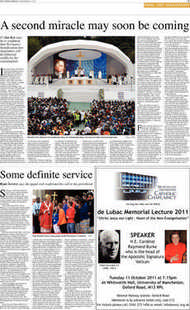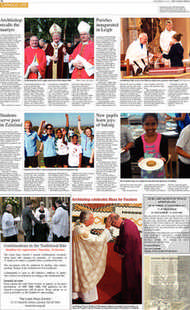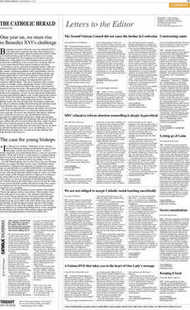Page 14, 16th September 2011
Page 14

Report an error
Noticed an error on this page?If you've noticed an error in this article please click here to report it.
Tags
Share
Related articles
Orchestra To Play For Peace
Impatience At Lack Of Vision
American Slovaks Reject Benes " Czechs Are Ulsterites Of...
Gramophone Recordings.
Apostasy In Pittsburgh
Gramophone Recordings
A steely Pittsburgh performance
Pittsburgh SO THE PROMS, LONDON
Don Giovanni
WOODHOUSE, SURREY Pittsburgh may not rank among among the Ivy League Five of the most illustrious American symphony orchestras but its history and conductors’ roster put it in the top 10. And its arrival at the Proms last week, with current conductor Manfred Honeck, was a hot-ticket event – helped by a familiar Beethoven/Tchaikovsky programme designed to sell.
In fact, it started with a curiosity: fragments from an epic fantasy on Berlioz’s Faust by the German composer Walter Braunfels whose career collapsed under the Nazis in the 1930s and never really recovered, although his opera Die Vögel has since made it on to disc. The Braunfels fantasy, alas, had nothing much to say so far as my ear was concerned. But the Beethoven 4th piano concerto (soloist Hélène Grimaud) and Tchaikovsky 5th Symphony that followed said a great deal. Much of it about the Pittsburgh players rather than the pieces.
Like all American orchestras of its class, the Pittsburgh sound conveys a sense of serious, industrial-strength power restrained by cultivation and good taste. It hits you like a hard punch in a velvet glove – especially the brass attack which has a habit of transforming every item on the programme into an approximation of the theme from Star Wars. It’s impressive, if not always how you want.
The Pittsburgh also does impressive pianissimi, and there were times here when the hush was so exquisitely controlled it took your breath away. This was a class act; and it came superbly shaped and phrased by Honeck, who is clearly a conductor of imagination, even if it prompts him to take the second movement of Tchaikovsky’s 5th with Mahlerian lethargy and play Beethoven with a sleekness that period sensibilities have taught us all to distrust.
As for Grimaud, she’s a pianist who divides opinion and clearly isn’t for everyone. But on the whole I find her playing thoughtful, fresh and fascinating – though her epic first movement cadenza was too much. Unbalancingly over-wrought.
I’ve mentioned Woodhouse Copse in this column before: it’s an Arts & Crafts house with a Gertrude Jekyll garden outside Dorking where the owner has a year-round concert series and a scooped-out amphitheatre beside a lake where once a year she stages operas, with much charm if not too many physical resources.
This year it was Don Giovanni done in a setting that was magical, so long as you weren’t bothered by the fact that this was damp and draughty Surrey as opposed to sunny, hot Seville. The staging was conventionally straightforward. A small pit orchestra played under the technically stiff but capable baton of Andrew Charity. And though it was cold and wet – as open-air opera in this country usually is: it’s a perverse undertaking – there was an undeniable enchantment.
But the damp aside, the show will stay with me for two reasons. One was the surprising quality of the voices – all young, most of them still studying. The Don himself (Australian Laurence Meikle) wasn’t hugely interesting but sang with clear, focused assurance: with a skilled director he could be a serious contender for this sort of role. That the Leporello (Pnini Leon Grubner) was Israeli made his caricatureJewish stage style (Shylock, Fagin, Fiddler on the Roof rolled into one) slightly uncomfortable but with a capacious bass voice there if he works out how to use it. And among the women was an utterly delightful, crystal clear if small-sounding Zerlina (Harriet Jones).
The other reason for remembering this Giovanni, though, was its fondness for water-entrances (well, if you’ve got water, why not?) with characters ferried in across the lake which Woodhouse audiences see behind the stage in the background. It’s a romantic gesture that over the years has become a house speciality: past seasons have produced a floating pyre for Dido and Aeneas (that effectively turned Purcell into Wagner) and a host of similar effects. This year the silent, ferried entrance of the maschere played like a scene from Joseph Losey’s classic film, but all the more effectively for being real. No camera tricks. I had a good time. So, alas, did the mosquitos.
blog comments powered by Disqus





















